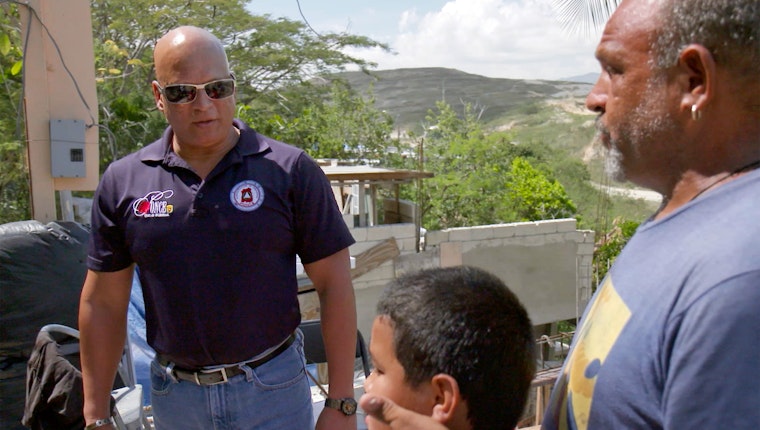Mayors to the Rescue in Puerto Rico
By Karina Claudio Betancourt

It’s been nearly a year since Hurricane Maria hit Puerto Rico, making landfall with 150-mile-per-hour winds and leaving the entire island in darkness, stranding thousands without food, water, access to medical care, or even cellular communication. As a Puerto Rican native living in New York, I spent anxious days trying to contact family members on the island and figure out how to lend a hand from afar when all systems had basically collapsed.
I was able to travel home for work the Monday after the storm, to gather information for the Open Society Foundations about needs on the ground. With a 6 p.m. curfew in place, I worked until midday, then stood in lines for hours to help procure cash, gas, and food for my family. This was routine for many Puerto Ricans as they struggled to return to normalcy. We all watched in agony as millions of citizens demanded water, food, and basic medical necessities—and we still watch in agony as problems with the electrical grid continue, and as the estimated death toll has risen to nearly 5,000.
The official response—from the federal government and island government alike—only seemed to make things worse.
What I found was complete chaos and devastation, as residents struggled with a disorganized and inadequate reaction. The Federal Emergency Management Agency’s (FEMA) decision to centralize all aid translated into bureaucratic hurdles that slowed delivery of relief—even for mayors on the mainland who were rushing to send much-needed supplies. The Trump administration mocked the Puerto Rican people; the president himself said we should be “proud of what happened on the island,” comparing the toll favorably with that of Hurricane Katrina. The reality is that the response from the federal government was inadequate, poorly prepared, and insulting in many ways. And the death toll, according to the latest estimates, was double that in New Orleans post-Katrina.
And yet there was light amid the darkness. Local officials, led by New Orleans Mayor Mitch Landrieu, decided to plow through all the red tape created by FEMA and launch the Mayor Exchange—an Open Society Foundations–sponsored initiative pairing mayors on the mainland with mayors on the island to show solidarity and share expertise. Landrieu flew down to the southern coastal town of Ponce in February to visit with Mayor María Meléndez and tour the damage. Since then, more than 30 mayors have met up in Puerto Rico and on the mainland—from Anaheim, California, to Providence, Rhode Island, Detroit, Chicago, Philadelphia, and points in between—to offer support and share information about their own experiences with disaster relief, emergency planning, and resiliency roadmaps for their cities.
I got to see some of them in action at a workshop recently in San Juan. Against the backdrop of so much hardship, it was truly uplifting to see mayors and their staffs coming together, rolling up their sleeves and learning from one another. The sight was a reminder that these are first responders—the ones who know their communities best, and are on the front lines serving their neighbors when disaster strikes.
The connections the mayors are making are already paying off as the island continues to work to rebuild from Maria’s wrath. Our hope is that the relationships being built today will continue to develop in the months ahead, as the next hurricane season gets underway and as local officials plan and prepare for what new storms may come. In the long term, we believe the bonds being forged today will also help raise awareness across the U.S. mainland about the complicated relationship it has with Puerto Rico, and the responsibility that we have as a nation to help Puerto Ricans rebuild and reimagine their future—and ours.
At Open Society, we believe in the power of local knowledge, and that policies work best when the communities they affect are present and heard from when decisions affecting their lives are being made. We’ve seen what happens when local voices aren’t heard in Puerto Rico, when the federal and island government assert their centralized authority and fail to take into account local leaders’ needs.
We are hopeful that through this Mayor Exchange, those local leaders will learn more about how to protect their residents in a crisis and how to better work with other levels of government to ensure that relief comes—and comes quickly—for those most in need. I am optimistic that on my next trip to the island, I will see the power of local knowledge in action, helping the island rebound from Maria and come back better than ever.
Karina Claudio Betancourt is project director for Open Society’s Puerto Rico Project.